Good Luck, Peppa
Following our publication of the Peppa Pig story last week, we’ve been receiving quite some emails, comments and Twitter DMs asking about one single issue: the recent “censorship” targeting Peppa here in China. “Didn’t you hear about the censorship?”, “how come you guys didn’t mention it in your article?”
It looks like censorship is everyone’s favorite topic (ours included, oops), so let’s start by talking about it. We are not ending with it though – because really, what we want to talk about today, is a more important matter than censorship itself.
-
The Peppa “Censorship”
On April 28th, Chinese news claimed that Douyin, the currently most popular short-video app in China, had banned Peppa Pig. The news provided no solid evidence except from posting an alleged “Douyin Community Rule”, which indeed listed Peppa as a “subversive element”.
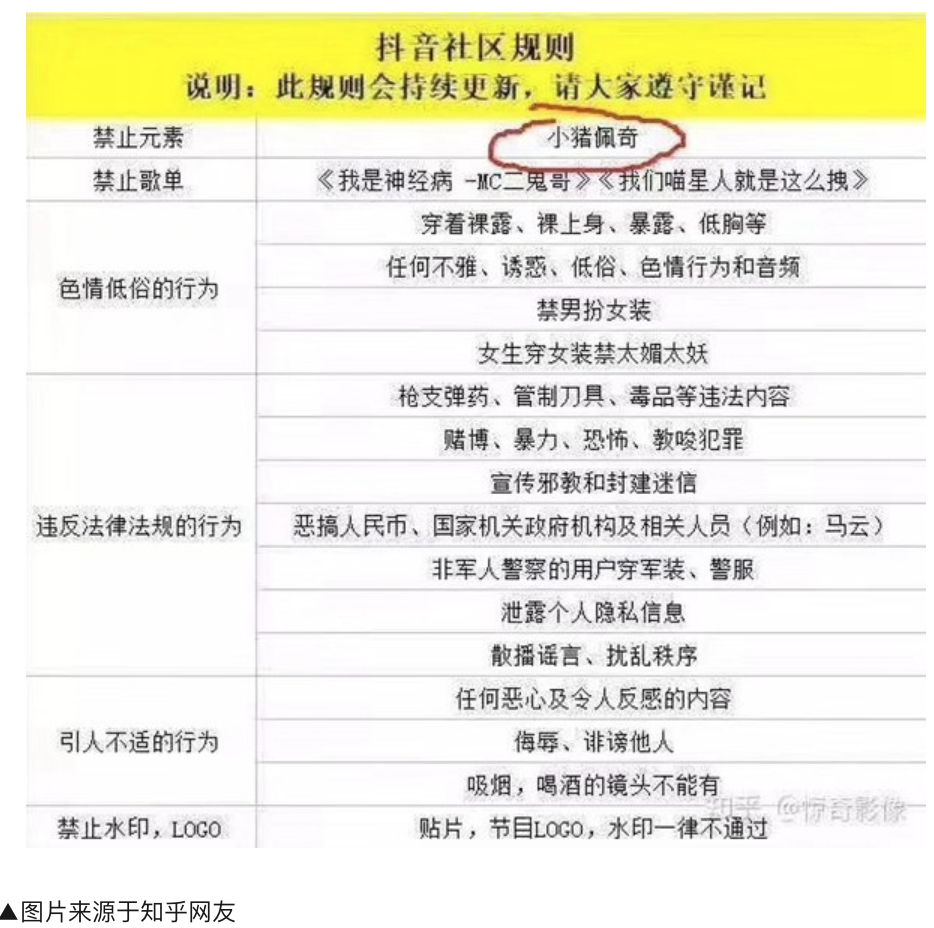
Doubting the credibility of this list (the news article claimed that it was from a “Zhihu user”), we immediately started our own research. As it turned out, the topic #Peppapig was indeed no longer searchable on Douyin, yet many UGC videos featuring Peppa still remained available. Furthermore, given videos on Douyin could only be searched with relevant hashtag or creator, we couldn’t tell whether the videos under #Peppapig were removed with the hashtag and hence become unsearchable, or completely deleted by the platform.
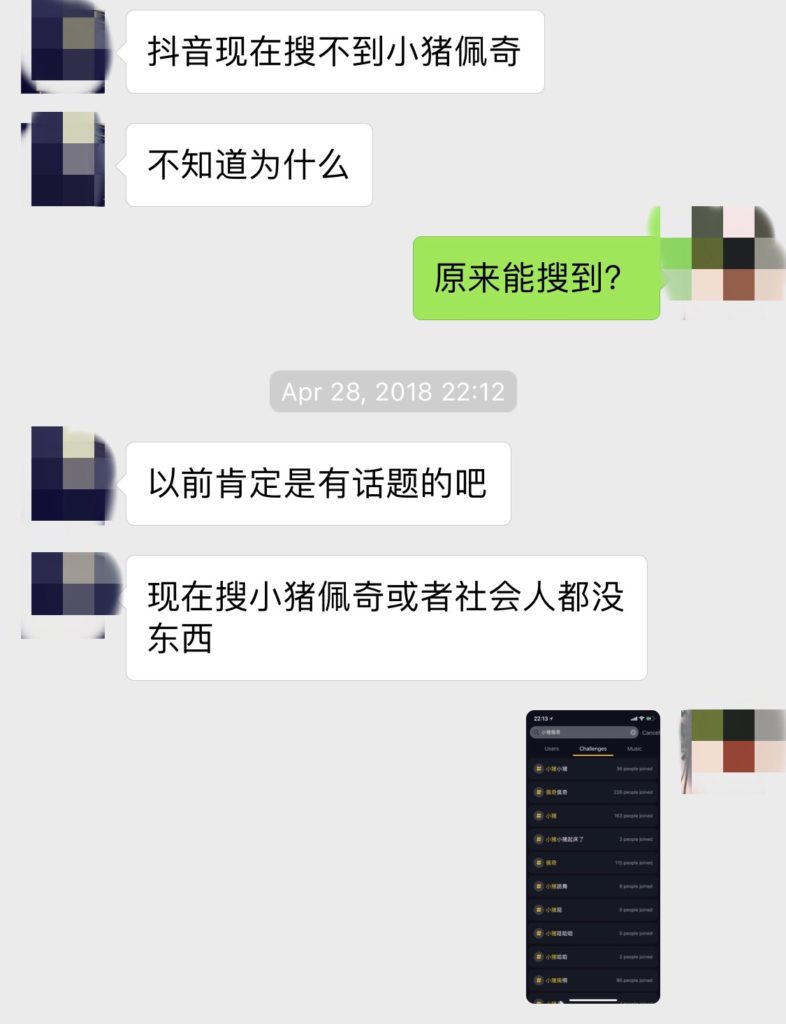
Yan and I discussing about the ban.
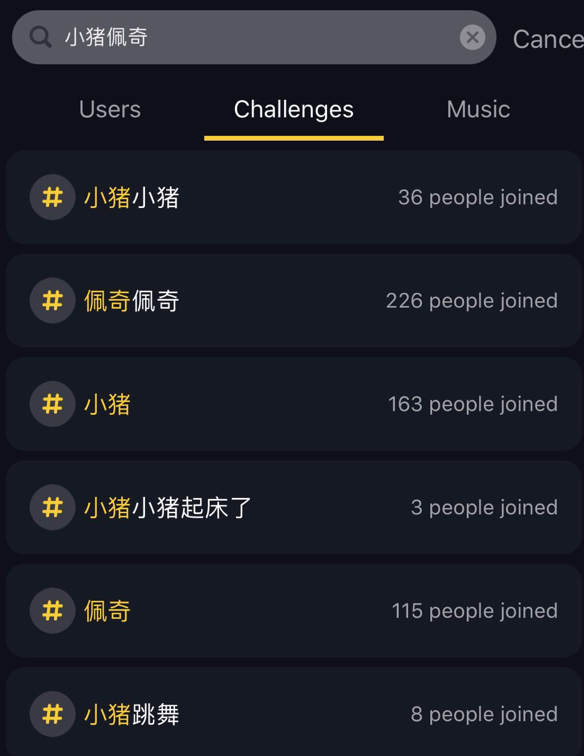
Search result on April 28th: the #Peppapig hashtag was unavailable, but alternative hashtags related to Peppa on Douyin still existed.
Knowing the unpredictable and unreasonable nature of China’s internet regulation, we decided to wait for a couple of days to see if there were further actions taken by Douyin or other social platforms. Meanwhile, we started to write our piece on Peppa, focusing on the relationship between its surging popularity and the social-psychological state of today’s Chinese young adults – a topic we believed to be more interesting and important than the unverified “censorship” at the time.
But while we waited, media began to shout.
A few days after the Chinese news came out suspecting Peppa’s mysterious disappearance on Douyin, many English media outlets, in particular the British and American ones, began to fiercely report the issue. By directly using verbs such as “banned”, “blocked”, “purged”, and of course, “censored” in titles, these news articles immediately coined Peppa’s disappearance, which was still unexplained by Douyin or any other official agencies at the time, to a certain political nature. To China watchers and readers in the English world, these reports became the evidences of Peppa Pig’s censorship in China at a collective level.
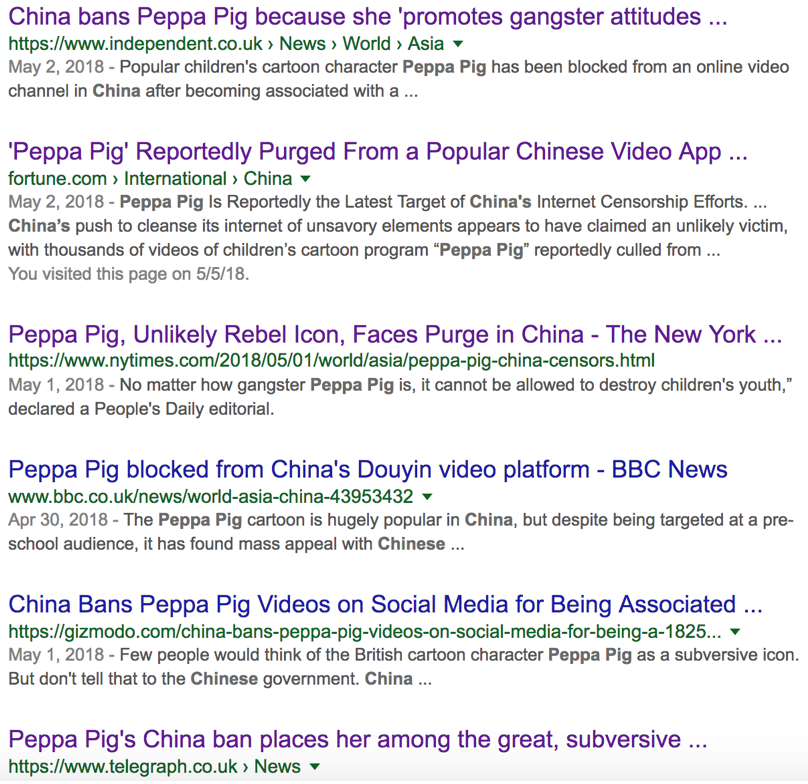
Some of the news titles over Peppa’s “censorship”.
Astonished by Western media’s accordant fashion in framing the event, we clicked into these news titles and read them through. We soon found out that the majority of these pieces referenced a piece by Global Times, China’s state-run English media, as the biggest supporting material to their stories.
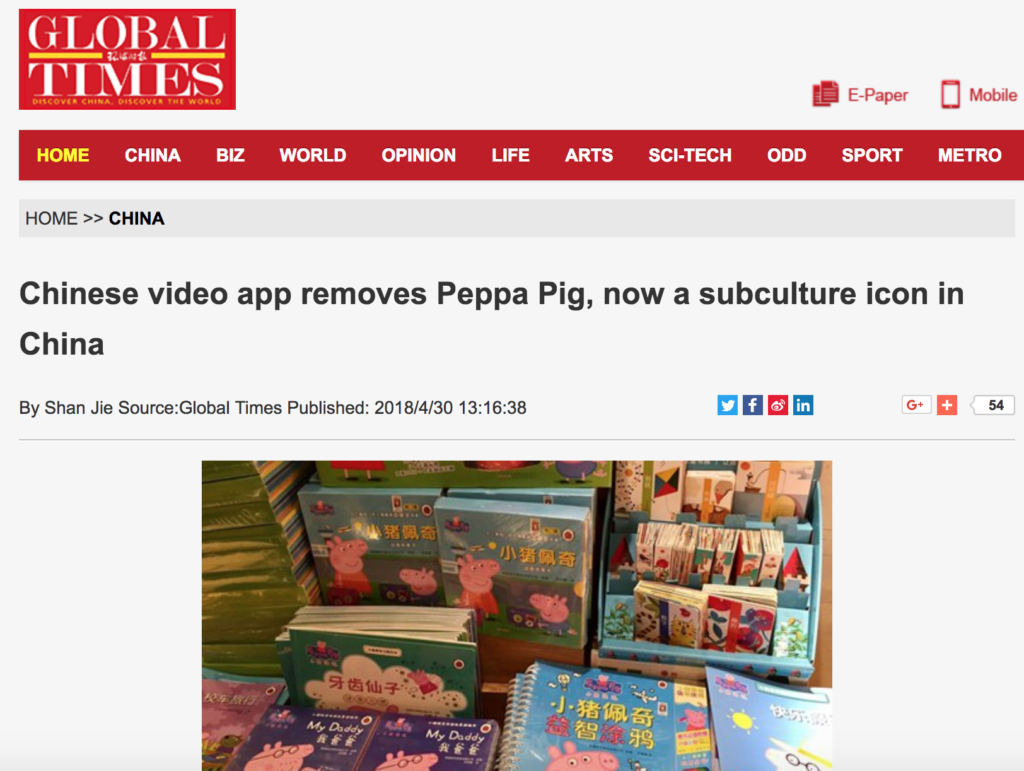
So we also read through the Global Times article. Despite stating that “Chinese web users are baffled that Peppa Pig has been removed from popular short-video platform Douyin” in its opening remark, the entire article never addressed the removal as a ban or regulation ordered from the top (of course, it was unlikely of it to use the term “censorship” given its party-owned nature). In fact, the article ended on a rather positive note, quoting a Chinese professor who suggested that “the Chinese society should be understanding toward the subcultures of young people”.
By the time we published our Peppa story on May 3rd, the reason for Douyin’s “Peppa control” still remained unclarified. Meanwhile, Peppa continued to be alive and thrive on all other Chinese social platforms and retail outlets.
On May 7th, news broke in China that Douyin had officially denied banning Peppa Pig. According to China Daily, another state-owned English news outlet, Douyins’s “banning incident”, which centered around the derivative videos of Peppa Pig, was a conduct to echo the State Administration of Radio and Television’s recent document on regulating online programs. The new regulation “prohibits to re-edit, re-dub or re-subtitle classics, radio and video programs and online original video programs without permission” – in other words, a measure for copyrights protection.
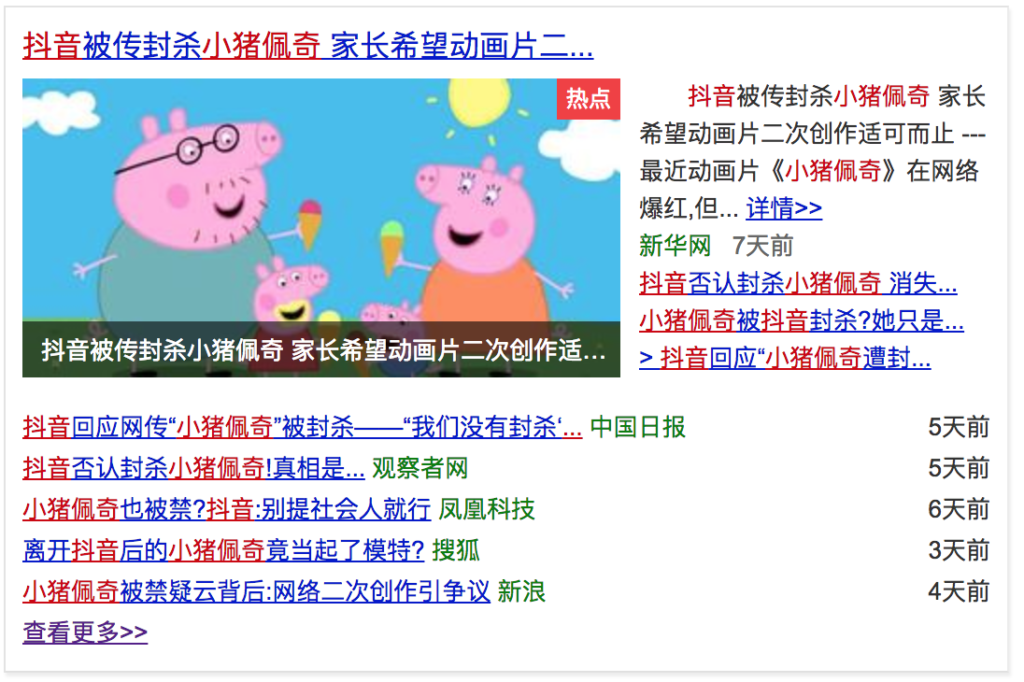
Chinese news clarifying that Peppa isn’t banned.
-
The Two Questions
We were motivated to write this post because we kept thinking about two questions.
Firstly, was Peppa really censored?
Although the China Daily article attributed Douyin’s management of Peppa-related content to copyrights protection, we couldn’t stop to remain suspicious. As we’ve pointed out many times, over the past few months, Chinese internet platforms such as Weibo, Kuaishou and Toutiao had all gone into panic mode, busy self-censoring and monitoring public speeches in order to keep with the government control of cyberspace. Although Douyin, the platform known for entertainment and lifestyle content, wasn’t directly called upon by the government as its sister product Toutiao was (both Douyin and Toutiao are products of ByteDance, one of the fastest growing technology company in China), the platform is certainly at no easier place. In fact, in mid-April, when Neihan Duanzi, another app from Bytedance, was ordered to shut down by the government, Douyin had to disable its comment feature for a couple of days because too many loyal users of Neihan Duanzi were rushing to Douyin to express their rage.
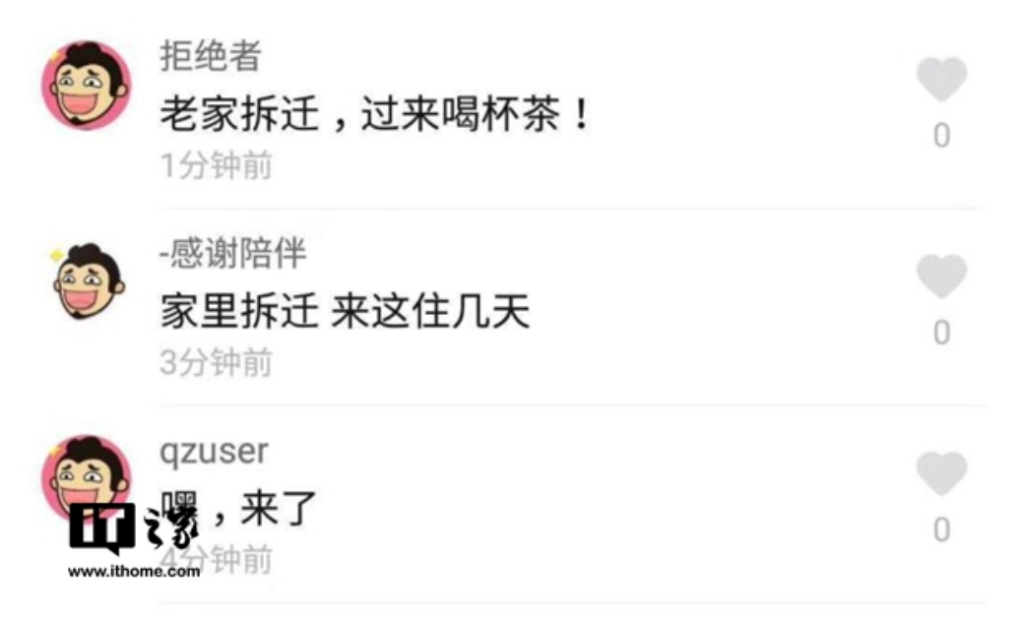
“My ‘hometown’ was torn, so I come to stay here for a few days!” - Neihan Duanzi users commenting on Douyin.
On April 26th, two days before the “Douyin Peppa-ban” made into news, People’s Daily, the official newspaper of the Chinese Communist Party, posted a commentary titled “How Many Steps Does It Take for Peppa Pig to Become an Internet Superstar”. In 1,000 Chinese characters, it first acknowledged Peppa Pig’s commercial success and educational value, then proceeded to discuss Peppa’s “social folk/social person” identity in a more skeptical tone. “No matter how ‘social’ Peppa Pig becomes”, said the commentary, “it shall not destroy the childhood of our kids, and cannot surpass the rules and bottom lines (of our society)”.
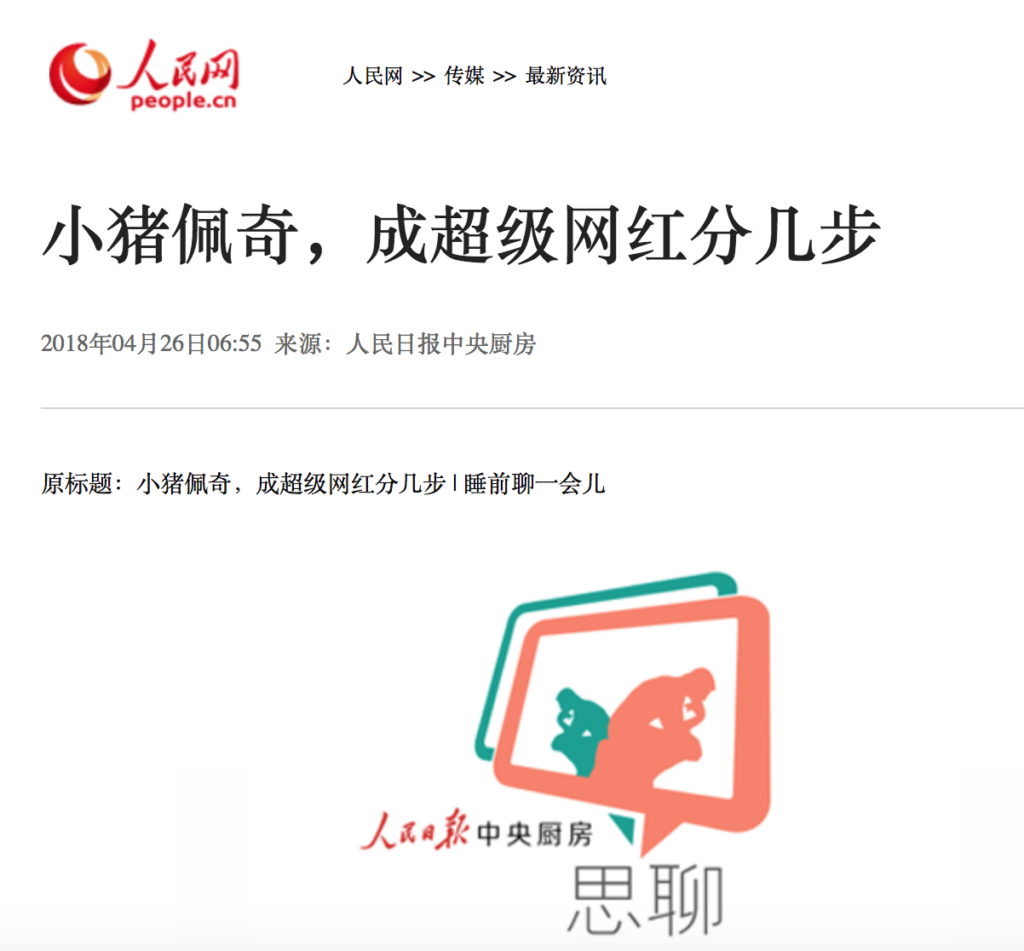
The People's Daily commentary on Peppa.
Given Bytedance, Douyin’s mother company’s strong “survival desire” (“求生欲”, a term joked by Chinese netizens nowadays mainly referencing to domestic internet companies’ attitude of “doing-everything-just-to-remain-alive-under-government-regulation”) and People’s Daily’s carefully worded commentary that could potentially be interpreted as condemning the “social folk” meme, it seemed logical that Douyin would regulate Peppa Pig - the “social folk” icon nowadays - by putting up a gesture of cleaning up Peppa-related content. Internal clearance motivated by self-preservation (remember what Weibo did a couple of weeks ago for #IamGay?) seemed to be a logical guess, but really, without direct government order for calling off Peppa Pig content in any means, we personally wouldn’t call it a censorship within the Chinese context, at least, not yet.
Now onto our second, and a more important question: what roles have the media played in this whole drama?
Not a positive one, if we might say. And we mean both Chinese and English media.
Like mentioned earlier, the whole “Peppa being censored” narrative started with a single “Douyin community rule” picture. Despite being widely quoted by numerous Chinese internet news accounts since the end of April, the picture turned out to be fake, as representative from Douyin eventually claimed a few days ago. Furthermore, although the hashtag #Peppapig did disappear, the disappearance could be only temporary, not to mention there are still videos featuring Peppa available on Douyin.
What disappointed us more was the reaction from western media – many are credible, just sources of information that we’ve personally trusted and looked up to. Instead of spending time to research what really was going on, they seemed to be merely attracted by the idea of censorship itself, the ultimate news ingredient that makes any China story juicer. Some of these English articles did include a certain amount of concrete facts to back Peppa’s popularity in China, yet by centering the entire reporting around a “censorship” title, they were deliberately framing the event in a direction that would potentially mislead readers. We believe Douyin’s Peppa-control is worth reporting, what we believe more however, is that there should be better, more nuanced, and more comprehensive way of reporting it, as with any other news story in this world.
Perhaps Yan and I are setting our standards too high. Perhaps we are being brainwashed by an authoritarian regime so deep that we are no longer able to identify our own stance in relation to the objective truth. Or perhaps, every one of us in this world is equally blinded in that we are only seeing things we want to see, and only hearing the stories that are tailored to our own tastes, beliefs and values.
(Having said all of these, we all know how capricious the Chinese government is when it comes to censorship - the real, hardcore, erase-it-all stuff. It had happened a couple of times that things we praised on Elephant Room had vanished overnight. So, good luck, Peppa.)
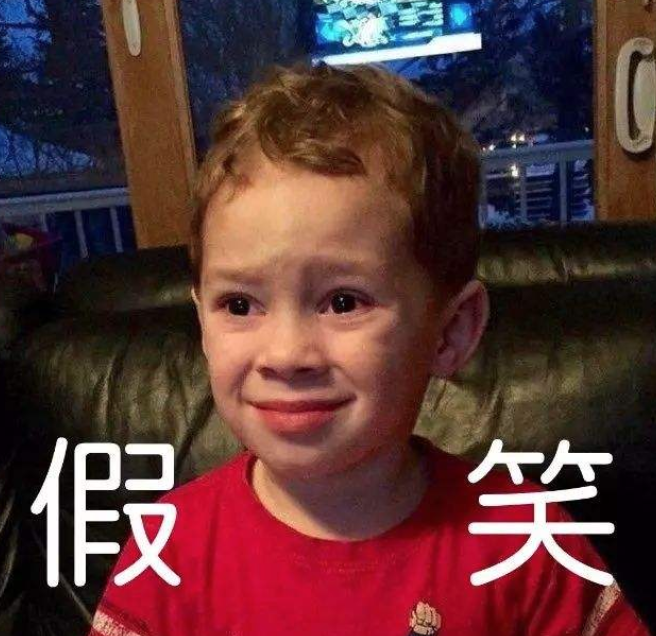

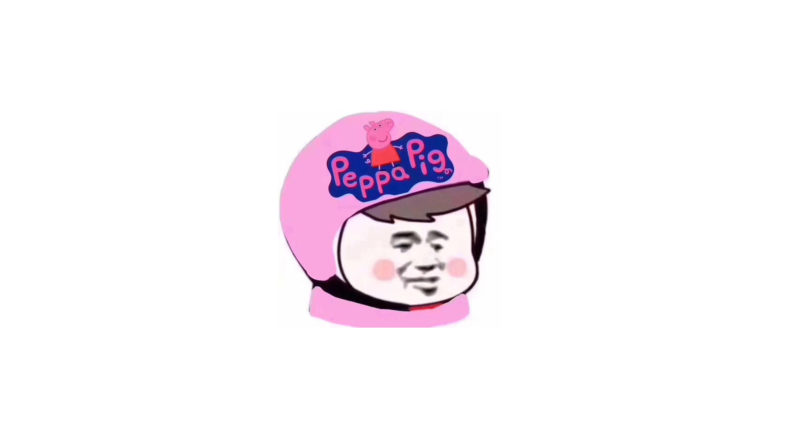
That was really great. Thanks again for the excellent writing/thoughts!
Great article – A single piece of information or unsubstantiated media report that leads to a wave of reputable media sources jumping onto a story is by no means limited to China news, but I do think it is more common and a reflection of the ignorance of most Western media towards China. Essentially what drives the articles is the desire for snippets of information that fit comfortably into readers’ preexisting understandings and biases towards a topic, but with just enough spice to get clicks. All readers want is something exotic and gives them a bit of shock, but at… Read more »
Biyi and Yan, I know you were being a bit tongue-in-cheek when you wrote that perhaps your standards were too high or you’ve been brainwashed, etc. but I want to say that I think this article, though a brief one that addresses a somewhat flippant issue, is some of the most thoughtful and balanced writing that I’ve read about China. On a lighter note, I think the overnight popularity of Peppa Pig is hilarious and I myself have ridden the wave. I even got a temporary tattoo of Peppa Pig to make sure everyone knows that I’m a “shehui” person.… Read more »
Iii